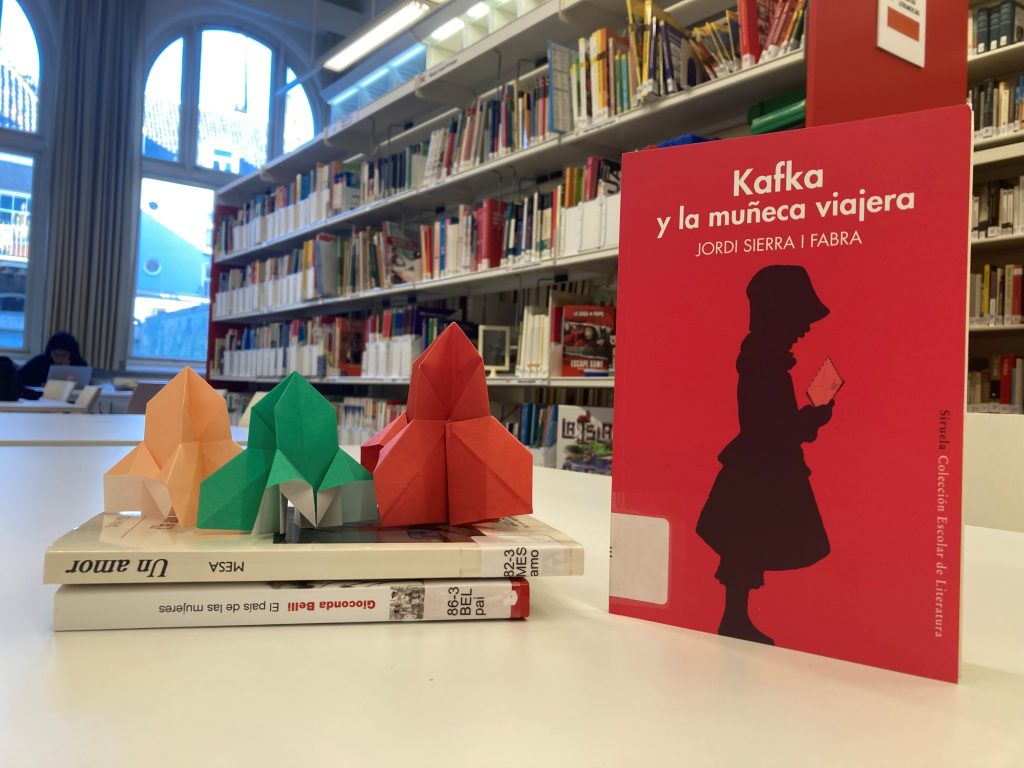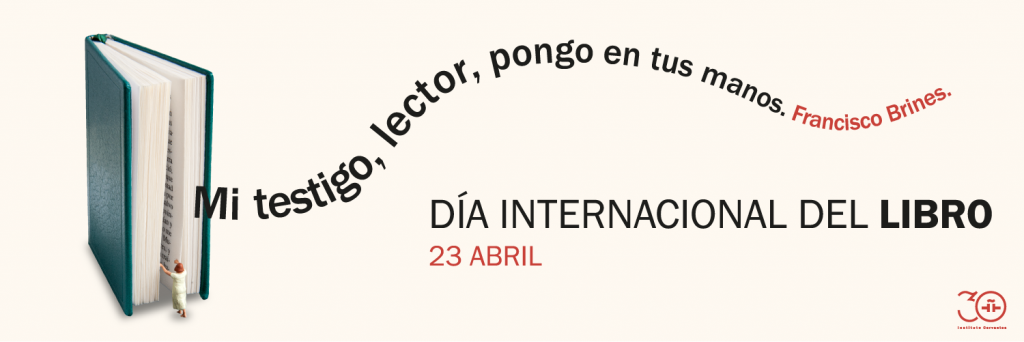Blog del Instituto Cervantes en Utrecht
Todo sobre nuestras actividades y servicios
¡Vuelve el YoQueTú a la biblioteca!
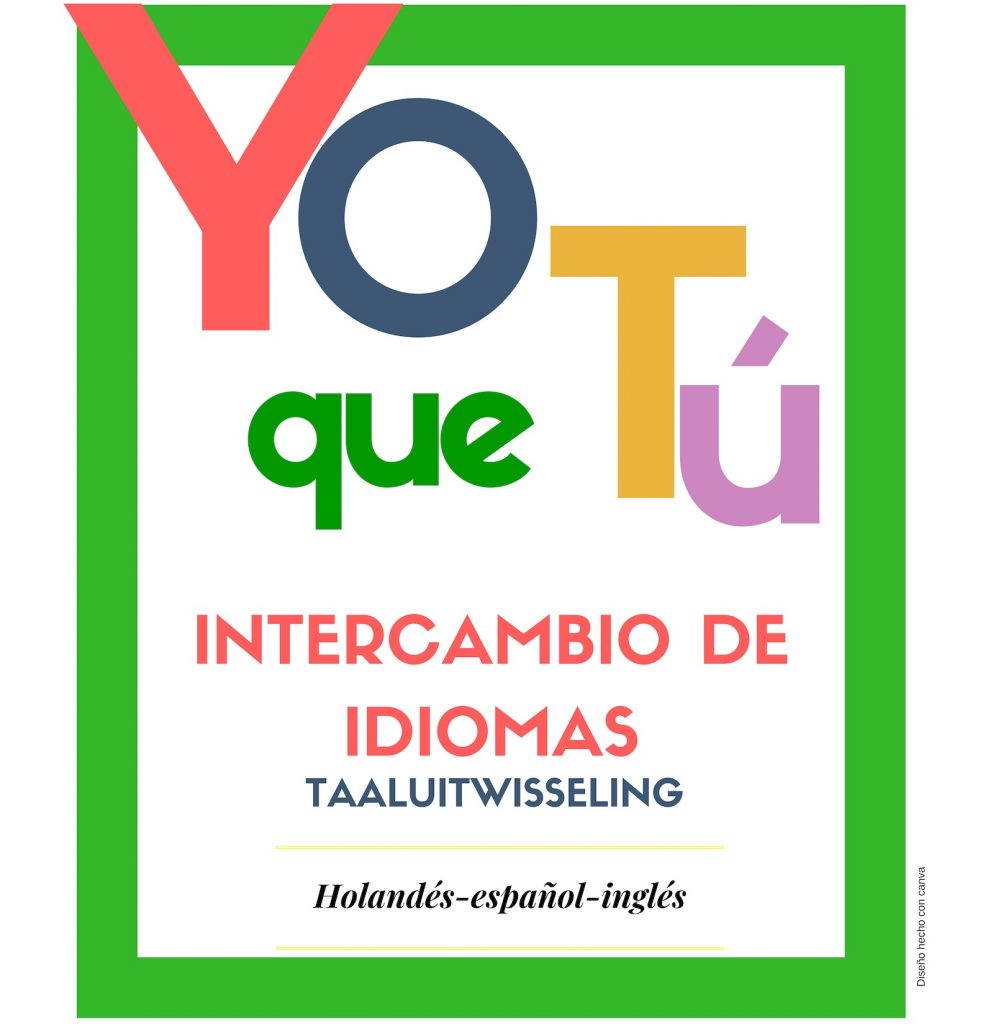
YO QUE TÚ
En abril recuperamos el YoQueTú ¡lo estábamos deseando! Si quieres practicar español , neerlandés o inglés, te esperamos en la biblioteca y te orientaremos si lo necesitas para que puedas hablar, conocer gente y pasar un rato estupendo.
Es imprescindible reservar en bibutr@cervantes.es y dinos que lengua quieres practicar y qué nivel tienes.
Próximas fechas: 18/05, 01/06, 15/06, 29/06, 13/07 de 18:00 a 19:00.
YO QUE TÚ
De YoQueTú gaan weer van start in de bibliotheek! We hebben er naar uitgezien! Als je jouw Spaans, Nederlands of Engels wilt oefenen, dan ben je van harte welkom in de bibliotheek. We hebben allerlei materiaal waarmee je aan de slag kunt om te praten, mensen te leren kennen en een geweldige tijd te hebben.
Reserveren is noodzakelijk via bibutr@cervantes.es. Vergeet niet te vermelden welke taal je wilt oefenen en wat je niveau is.
Volgende data 18/05, 01/06, 15/06, 29/06, 13/07 van 18:00-19:00 uur.
YoQueTú: intercambio de idioma y cultura
La biblioteca del Instituto Cervantes de Utrecht ofrece un espacio de encuentro entre neerlandeses e hispanohablantes para la práctica de la expresión oral en español, neerlandés e inglés, así como el intercambio cultural. Las reuniones se realizan dos miércoles al mes en la biblioteca del Instituto Cervantes de Utrecht (Domplein, 3 – Utrecht) de 18:00 a 19:00
¿En qué consiste?
1- Se trata de espacio de libre de intercambio, no de una clase de idiomas.
2- Formaremos grupos según varios niveles: inicial, intermedio y superior
3- El Instituto Cervantes proporcionará material didáctico y de apoyo para guiar el intercambio.
4- Pondremos a tu disposición todos los recursos de la biblioteca que puedas necesitar: diccionarios, manuales, gramáticas, tablet, e-reader, internet…
5- La actividad es gratuita, la inscripción es obligatoria a través del formulario de inscripción.
Gratis. Inscripción obligatoria
Als ik jou was: Taaluitwisseling
De bibliotheek van het Instituto Cervantes biedt een ontmoetingsmogelijkheid voor Nederlanders en Spaanssprekenden om taal– en luistervaardigheid te oefenen in het Spaans, Nederlands en Engels, en het zo tot een interculturele uitwisseling te maken. De ontmoetingen vinden twee woensdagen per maand plaats in de bibliotheek van het Instituto Cervantes, Utrecht (Domplein 3, Utrecht) van 18:00 tot 19:00 .
Wat houdt het in?
- Het betreft een uitwisselingsmogelijkheid, géén taalcursus.
- Er worden groepjes gevormd, ingedeeld op verschillende niveaus: beginners, gemiddeld en gevorderden.
- Het Instituto Cervantes stelt didactisch materiaal ter beschikking en zorgt voor ondersteuning bij de uitwisseling.
- Je kunt gebruik maken van al het aanwezige materiaal in de bibliotheek: woordenboeken, handboeken, grammaticaboeken, tablets en internet.
- De activiteit is gratis, maar inschrijving is verplicht via een formulier.
Gratis. Inschrijving verplicht
¡Vuelven las actividades infantiles a la biblioteca!
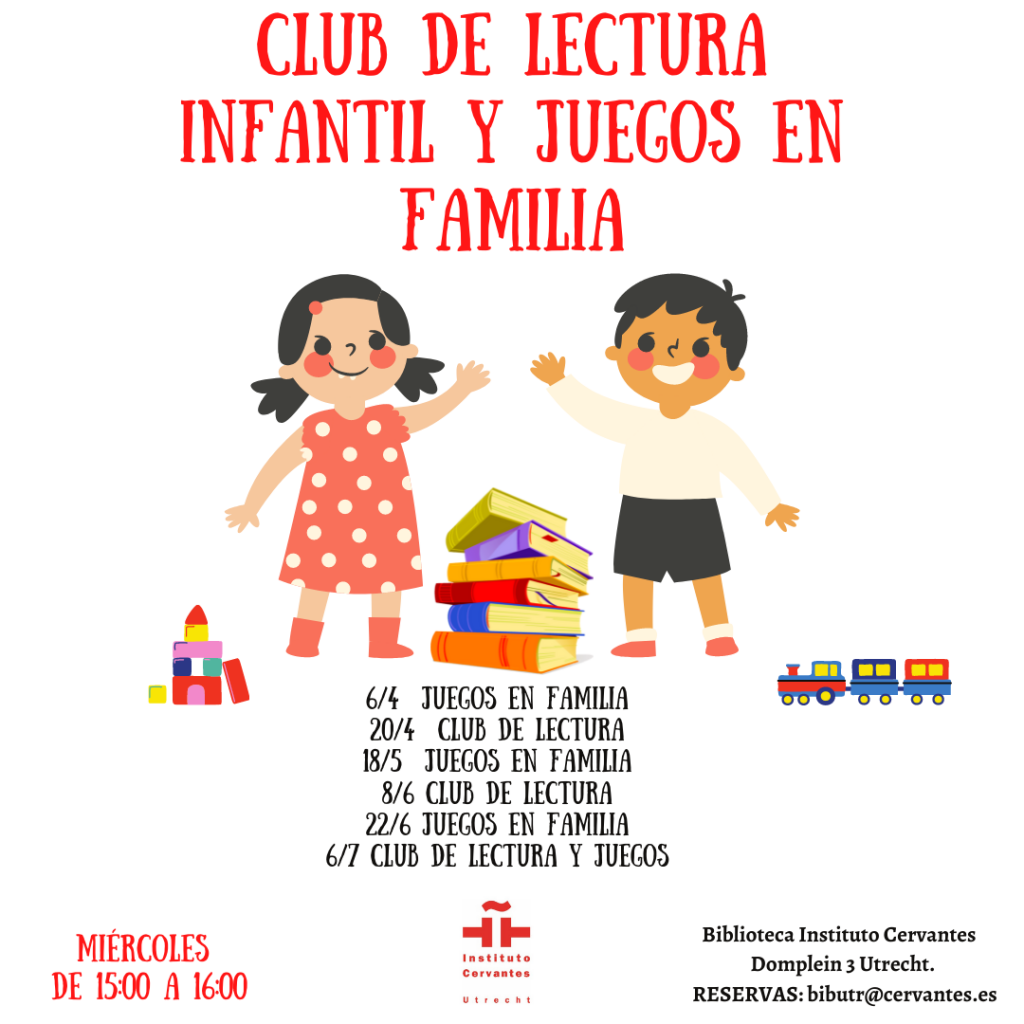
ACTIVIDADES INFANTILES : CLUB DE LECTURA Y JUEGOS EN FAMILIA.
Retomamos las actividades infantiles en la biblioteca. 2 miércoles al mes de 15:00 a 16:00 ven a nuestro rincón infantil a jugar o al club de lectura ¡os esperamos!
Más información y reservas en bibutr@cervantes.es
KINDERACTIVITEITEN: KINDERLEESCLUB EN GEZELSCHAPSSPELLETJES
De kinderactiviteiten gaan weer in april beginnen in de bibliotheek! Twee woensdagen per maand ben je van harte welkom in onze kinderhoek om te spelen of samen te lezen. We verheugen ons jullie weer te zien! Voor meer informatie en reserveren: bibutr@cervantes.es
CLUB DE JUEGOS EN FAMILIA
¿Estás preparado/a para pasártelo bien? ¿Puedes imaginarte una biblioteca llena de magia? ¿Te apetece conocer a otros niños que también hablan español y jugar con ellos? Pues ven al club de juegos del Instituto Cervantes de Utrecht.
Juegos de mesa y manualidades en español para pasarlo bien en familia. El juego como excusa para practicar el español en un contexto lúdico. Se celebra una vez al mes en el rincón infantil de la biblioteca. Para niños a partir 4 años.
Los clubs infantiles de la biblioteca son actividades colaborativas que reúnen a las familias entorno a la lectura y el juego en español. Con la ayuda y coordinación de la biblioteca y el área académica l@s niñ@s y las familias proponen juegos y lecturas y disfrutan compartiéndolos con otr@s niñ@s.
Dos miércoles al mes de 15:00 a 16:00 en el rincón infantil de la biblioteca.
Gezelschapsspelletjes
Heb je zin om iets leuks te gaan doen? Kun je je een bibliotheek vol magie voorstellen? Wil je andere kinderen ontmoeten die ook Spaans spreken en samen met hen spelen? Kom dan naar de spelletjesclub van het Instituto Cervantes in Utrecht.
Spelletjes doen en knutselen in het Spaans om samen met het hele gezin plezier te hebben.
Spelen en tegelijkertijd op een andere manier Spaans leren. De spelletjesclub van het Instituto Cervantes in Utrecht vindt een keer per maand plaats in de kinderhoek van de bibliotheek en is voor kinderen vanaf 4 jaar.
De kinderclubs van de bibliotheek zijn samenwerkingsactiviteiten die het hele gezin samenbrengt rondom het lezen en spelen in het Spaans. Met hulp en coördinatie vanuit de bibliotheek en de docenten kunnen kinderen en gezinnen spelletjes voorstellen en boeken uitkiezen om samen met andere kinderen mee te spelen en van te genieten.
Twee woensdagen per maand, van 15:00 tot 16:00 uur in de bibliotheek van het Instituto Cervantes Utrecht.
CLUB INFANTIL DE LECTURA
Una forma de acercar a los más pequeños a la lectura como forma de aprendizaje del idioma. Ven a disfrutar de historias fascinantes o trae tu libro favorito y léelo con tu mamá o tu papá en el club de lectura. También puedes contarnos alguna aventura, una adivinanza imposible de descubrir o un trabalenguas que nos deje la lengua hecha un trapo. Seguro que habrá un montón de libros que te querrás llevar a casa para seguir leyendo.
Los clubs infantiles de la biblioteca son actividades colaborativas que reúnen a las familias entorno a la lectura y el juego en español. Con la ayuda y coordinación de la biblioteca y el área académica l@s niñ@s y las familias proponen juegos y lecturas y disfrutan compartiéndolos con otr@s niñ@s.
Dos miércoles al mes de 15:00 a 16:00 en el rincón infantil de la biblioteca.
Kinderleesclub
Een manier om kinderen dichter bij het lezen te brengen en tegelijkertijd een taal te leren. Kom genieten van fascinerende verhalen of neem je favoriete boek mee en lees deze met mama of papa in de leesclub. Je kan ons ook een avontuur vertellen, een onmogelijk op te lossen raadsel vertellen of een tongbreker zeggen die onze tong in een knoop legt. Er zullen vast een hoop boeken zijn die je zal willen meenemen naar huis om verder te lezen.
De kinderleesclubs van de bibliotheek zijn een gemeenschappelijke activiteit die gezinnen samenbrengt om in het Spaans te lezen en spelletjes te doen. Met de hulp en coördinatie van de bibliotheek en de docenten kunnen kinderen en gezinnen spelletjes en boeken voorstellen en genieten door deze te delen met andere kinderen.
Twee woensdagen per maand, van 15:00 tot 16:00 uur in de bibliotheek van het Instituto Cervantes Utrecht
Club de lectura: «Kafka y la muñeca viajera»
Reseña realizada por Kim Hagedoorn, miembro del Club de Lectura del Instituto Cervantes de Utrecht.
En esta reunión del Club de Lectura hablamos de la novela juvenil Kafka y la muñeca viajera (2006) del escritor español Jordi Sierra i Fabra (Barcelona, 1947). Es uno de los autores más leídos en las escuelas primarias y secundarias en España. Además, ha escrito másde 500 libros en varios géneros literarios: desde la literatura juvenil e infantil, el ensayo y la poesía hasta las biografías de gran artistas musicales como John Lennon y Bob Dylan.
En 2007, Sierra i Fabra ganó el Premio Nacional de Literatura Infantil y Juvenil de las Letras Españolas por Kafka y la muñeca viajera. La historia está basado en un artículo del escritor argentino César Aira (publicado en El País/Babelia). Aira describe una anécdota literaria: en 1923,el gran escritor alemán Franz Kafka encontró en el parque Steglitz en Berlín a una niña llorando, porque había perdido su muñeca. Kafka inventó una historia especialmente para la niña: su muñeca no estaba perdida, sino que se había ido de viaje para conocer el mundo. Además, durante unas semanas, Kafka le traería cartas escritas desde el punto de vista de la muñeca viajera. Años después, el editor Klaus Wagenbach fue en búsqueda de la niña mayor y las cartas de Kafka, pero en vano.
Según Aira: “El contrato de una niña con su muñeca es un contrato semiótico, una creación de sentido, sostenida en la tensión del verosímil y la fantasía. De ahí que la anécdota no sea casual: Kafka fue el más grande descubridor de signos en la vida moderna.”
En la obra de Sierra i Fabra, el Kafka ficticio confiesa que su nuevo oficio como ‘cartero de muñecas’ es el trabajo de mayor importancia que había hecho en muchos años. Parece que Kafka escribe las cartas también por razones personales: había sufrido mucho en su juventud, y le había faltado un ‘cartero de muñecas’. Al final de tres semanas epistolares, Kafka regala una nueva muñeca a la niña (como regalo de despedida de la muñeca viajera).
En el Club de Lectura, los participantes han hablado también de las historias ‘curiosas’ que los padres suelen contar a sus hijos, como la historia de San Nícolas y el Tió de Nadal. Aunque el libro está basado en hechos reales, la historia tiene algo surreal: se lee más bien como un cuento de hadas, apoyado también por las ilustraciones maravillosos de Pep Montserrat. El lenguaje literario de Sierra i Fabra es muy fácil de leer, y los participantes del Club recomendarían esta novela a todos los estudiantes que quieren leer más libros en español.
Crónica de una asignatura / De kroniek van een vak / A chronicle of a course
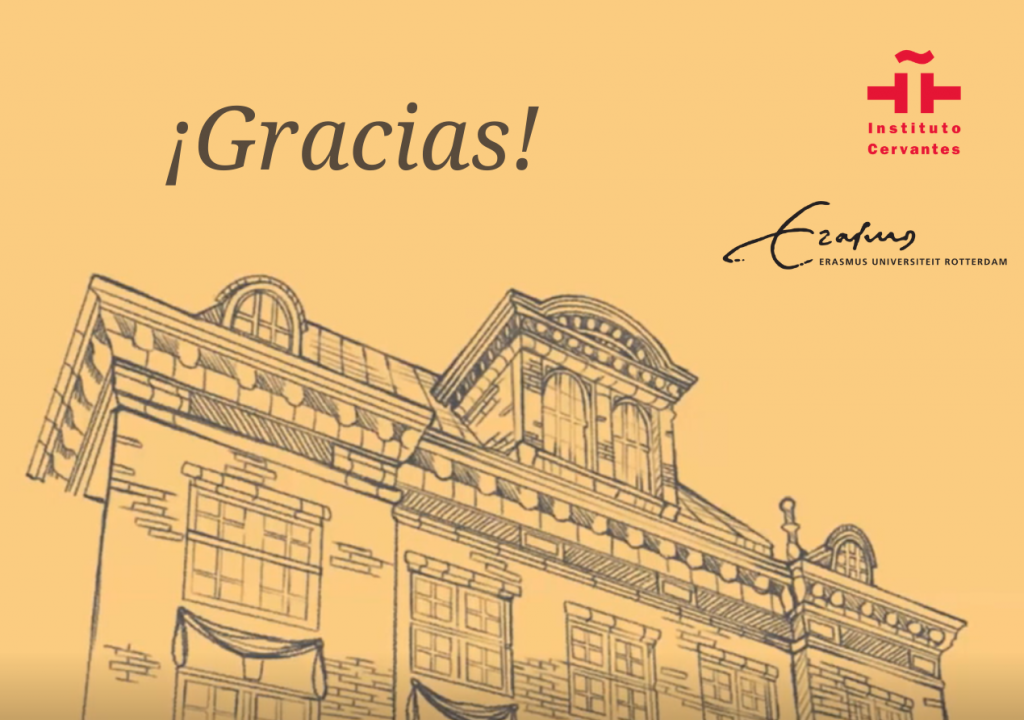
Este año, el Instituto Cervantes de Utrecht ha tenido el placer y la fortuna de ser el foco de estudio de los alumnos de la asignatura Introduction to cultural policy de la Universidad de Erasmus de Róterdam, bajo la supervisión de dr. FJC Brouwer. El objetivo de esta materia era “desarrollar una estrategia política sólida para promover el estudio y la práctica del español en los Países Bajos a todos los niveles.” [1]
Durante ocho semanas, los alumnos han estudiado intensamente la labor del Instituto Cervantes de Utrecht, su posición en los Países Bajos, sus puntos fuertes y débiles, sus actividades, etc. En definitiva, han llegado a conocer el Instituto casi tanto como los que formamos parte de él.
También han analizado la posición de idioma español en este país, ¡y es muy popular! Desde que es posible estudiarlo en la educación secundaria, cada año más alumnos se animan a aprender este idioma. Es la lengua preferida del 42% de los jóvenes neerlandeses y la primera opción a elegir como destino del Erasmus (¡y no creemos que sea solo por las tapas!).
De su gran labor de investigación han salido numerosos e interesantes trabajos en los que los alumnos, organizados en grupos, expresaban su visión del Instituto y daban recomendaciones. Además, cada grupo estudió la política cultural de España y otro país de América Latina.
Los nueve grupos que hicieron los mejores trabajos tuvieron la oportunidad de presentarlos ante el siguiente jurado, que elegiría al grupo ganador:
• Pilar Tena, directora del Instituto Cervantes de Utrecht
• Marielies Schelhaas, Secretaria General de la Comisión nacional neerlandesa de UNESCO
• Arnoldo Brenes Castro, Embajador de Costa Rica en los Países Bajos
• Mikko Fritze, Director del Goethe-Institut Netherlands
Durante sus presentaciones los alumnos superaron todas las expectativas y sorprendieron al jurado. A través de videos hechos por ellos mismos (si pinchas aquí podrás ver, por ejemplo, el del grupo llamado Cuba #1) y sobre todo con mucho entusiasmo, expresaron sus ideas de la manera en la que lo habría hecho una consultoría profesional.
Abrumados por la originalidad de las propuestas, el jurado tuvo grandes dificultades eligiendo al ganador. Al final el grupo premiado fue Perú, que había salido a las calles de Utrecht a pedir a neerlandeses que pronunciaran palabras como “hijastro” o “correcaminos” y propusieron la creación de una app llamada “Cervantastic” (que contaría con clases online, lecciones de cocina y mucho más).
Entre otras propuestas encontramos traducir la página web al inglés o dirigir un proyecto de Pen-Pal. También nos describieron cómo mejorar nuestra presencia online o la importancia de Spotify. Hemos acogido todas las ideas (¡no solo las de los nueve grupos finalistas!), las estamos analizando y sin duda pondremos en marcha algunas de ellas.
Desde el Instituto Cervantes nos sentimos agradecidos, impresionados y más que satisfechos con el trabajo realizado. Creemos que es imprescindible escuchar lo que las nuevas generaciones tienen que decir y que aportar. Al igual que el idioma español, son el futuro, y su aportación tiene un valor incalculable.
¡Gracias! Bedankt!
[1] dr.FJC Brouwer, Syllabus Introduction to Cultural Policy (CC1006). Erasmus Universiteit Rotterdam, 2020.
NEDERLANDS
De kroniek van een vak
Het Instituto Cervantes in Utrecht heeft dit jaar het genoegen gehad om het onderzoeksonderwerp te zijn voor de studenten van de Erasmus Universiteit in Rotterdam binnen het vak Introduction to cultural policy, onder begeleiding van Dr. F.J.C. Brouwer. Het doel van dit vak was «het ontwikkelen van een solide politieke strategie om het onderwijs en gebruik van de Spaans taal in Nederland op alle niveaus te bevorderen».[1]
Gedurende acht weken hebben de studenten het werk van het Instituto Cervantes in Utrecht aandachtig onderzocht: de positie in Nederland, de sterke en zwakke punten, de activiteiten, enz.. Kortom, ze hebben het Instituto bijna net zo goed leren kennen als degenen die er werken.
Ze hebben ook gekeken naar de positie van de Spaanse taal in Nederland, en ze zijn erachter gekomen dat het een erg populaire taal is! Sinds de mogelijkheid bestaat om voor Spaans te kiezen op de middelbare school, maken elk jaar steeds meer leerlingen deze keuze. 42% van de jonge Nederlanders vindt Spaans de leukste vreemde taal en Spanje staat op de eerste plaats als Erasmusbestemming (en we denken niet dat het alleen vanwege de tapas komt!).
Dit belangrijke onderzoekswerk heeft geresulteerd in vele interessante papers waarin de studenten, verdeeld in werkgroepen vernoemd naar Spaanstalige landen, hun visie op het instituut hebben gegeven en aanbevelingen hebben gedaan. Daarnaast heeft elke groep het cultuurbeleid van Spanje en een ander Latijns-Amerikaans land onderzocht.
De negen groepen die de beste papers schreven, kregen de kans hun voorstel te presenteren aan deze jury, die vervolgens de winnende groep zou kiezen:
- Pilar Tena, directeur van het Instituto Cervantes in Utrecht
- Marielies Schelhaas, secretaris-generaal van de Nederlandse Nationale Commissie van UNESCO
- Arnoldo Brenes Castro, ambassadeur van Costa Rica in Nederland
- Mikko Fritze, directeur van het Goethe-Institut Nederland
Tijdens hun presentaties overtroffen de studenten alle verwachtingen en verrasten ze de jury. Via zelfgemaakte video’s (als je hier klikt kun je bijvoorbeeld de video van de Cuba # 1-groep zien) toonden ze vooral met veel enthousiasme hun ideeën zoals ook een professioneel adviesbureau het zou hebben gedaan.
Overweldigd door de originaliteit van de voorstellen, had de jury grote moeite om de winnaar te kiezen. Uiteindelijk werd Peru de winnende groep. Zij waren de straten van Utrecht was opgegaan om Nederlanders te vragen woorden uit te spreken als «hijastro[2]» of «correcaminos[3]«. Ze stelden ook voor om een app te maken met de naam «Cervantastic» (met online lessen, kooklessen en nog veel meer).
Andere voorstellen waren onder meer het vertalen van de website in het Engels of het runnen van een Pen-Pal-project. Ze hebben ook beschreven hoe we onze online aanwezigheid of het belang van Spotify kunnen verbeteren. We hebben alle ideeën verzameld (niet alleen die van de negen finalisten!), we zijn druk bezig ze te analyseren en we zullen er zeker een aantal uitvoeren.
Wij van het Instituto Cervantes zijn erg dankbaar, onder de indruk en meer dan tevreden over het werk dat de studenten hebben verricht. Wij vinden het erg belangrijk te luisteren naar wat de nieuwe generaties te zeggen hebben en we willen weten wat hun ideeën zijn. Net als de Spaanse taal zijn zij de toekomst, en hun bijdrage is van onschatbare waarde. Bedankt!
[1] dr.FJC Brouwer, Syllabus Introduction to Cultural Policy (CC1006). Erasmus Universiteit Rotterdam, 2020.
[2] “Hijastro” betekent “stiefzoon”
[3] “Correcaminos” is de Spaanse naam van het Warner Brothers figuur the Road Runner
INGLÉS
A chronicle of a course
This year, the Instituto Cervantes in Utrecht has had the pleasure of being the focus of study by the students of the course Introduction to cultural policy at the Erasmus University Rotterdam, under the supervision of Dr. FJC Brouwer. The aim of the course was “to develop a sound political strategy to promote the study and practice of Spanish in the Netherlands at all levels”[1].
During eight weeks, the students have intensively studied the work of the Instituto Cervantes in Utrecht, its position in the Netherlands, its strengths and weaknesses, its activities, etc. In short, they got to know the Instituto almost as well as those who are part of it.
They have also analysed the position of the Spanish language in this country, and it is very popular! Since it has been possible to study Spanish in secondary education, more and more students choose to learn this language every year. It is the preferred language of 42% of young Dutch people and Spain is the first choice as an Erasmus destination (and we don’t think it’s just because of the tapas!).
A lot of interesting research work has resulted in many fascinating papers in which the students, organised in groups, expressed their vision of the Institute and gave recommendations. In addition, each group studied the cultural policy of Spain and another Latin American country.
The nine groups that produced the best papers had the opportunity to present them to the following jury, which would choose the winning group:
- Pilar Tena, Director of the Instituto Cervantes in Utrecht
- Marielies Schelhaas, Secretary General of the Dutch National Commission of UNESCO
- Arnoldo Brenes Castro, Ambassador of Costa Rica to the Netherlands
- Mikko Fritze, Director of the Goethe-Institut Netherlands
During their presentations the students exceeded all expectations and surprised the jury. Through self-made videos (if you click here you can see, for example, the video of the Cuba #1 group) and above all with a lot of enthusiasm, they expressed their ideas in the way a professional consultancy would have done it.
Overwhelmed by the originality of the proposals, the jury had great difficulty choosing the winner. In the end the winning group was Peru, who had gone to the streets of Utrecht to ask Dutch people to pronounce words such as «hijastro[2]» or «correcaminos[3]«. They also proposed the creation of an app called «Cervantastic» (which would feature online classes, cooking lessons and much more).
Other proposals included translating the website into English or running a Pen-Pal project. They also described how to improve our online presence or the importance of Spotify. We have welcomed all the ideas (not only those of the nine finalist groups!), we are analysing them and we will certainly implement some of them.
We at the Instituto Cervantes are very grateful, impressed and more than satisfied with the work that the students have done. We believe that it is essential to listen to what the new generations have to say and to their proposals. Like the Spanish language, they are the future, and their contribution is of incalculable value.
Thank you! Bedankt!
[1] dr.FJC Brouwer, Syllabus Introduction to Cultural Policy (CC1006). Erasmus Universiteit Rotterdam, 2020.
[2] “Hijastro” means “stepson”
[3] “Correcaminos” is the Spanish name of the Warner Brothers character the Road Runner
Día del libro / Wereldboekendag 2021
En el Día Internacional del Libro 2021 nos vamos a centrar en la figura de Antonio Machado, uno de los poetas más importantes e influyentes de España. Para ello hemos preparado un programa especial con la colaboración de la Fundación Antonio Machado y con Summer Films.
El 23 de abril a las 16:00 comenzaremos con una actividad infantil titulada “El sol es un globo rojo”. A las 17:30 disfrutaremos de un interesante y enriquecedor coloquio sobre el poeta, y a las 20:00 podremos ver un bellísimo documental sobre la historia y vigencia de la obra de Machado.
Sin embargo, que dediquemos el Día Internacional del Libro al poeta sevillano no significa que nos hayamos olvidado del escritor que da nombre a nuestra institución. Para celebrar a Cervantes y al Quijote, este año hemos decidido mirar hacia atrás. ¿Cómo se celebraba la figura del Quijote en 1905? ¿A quién se le ocurrió la idea de celebrar el aniversario de la publicación de un libro por primera vez? ¿Por qué celebramos el Día del libro el 23 de abril?
Hemos preparado un artículo en español e inglés con respuestas a estas preguntas y mucho más. Lo encontrarás en el siguiente enlace.
¡Feliz lectura!
Dit jaar op Wereldboekendag 2021 staat de figuur Antonio Machado centraal, één van Spanje’s belangrijkste en meest invloedrijke dichters. We hebben daarvoor een speciaal programma samengesteld in samenwerking met de Fundación Antonio Machado en Summer Films.
Op 23 april starten we om 16:00 uur met een kinderactiviteit getiteld “De zon is een rode ballon”. Om 17:30 uur kunnen we genieten van een boeiend en informatief gesprek over de dichter, en om 20:00 uur begint een prachtige documentaire over de geschiedenis en de universele waarde van het werk van Machado.
Alhoewel Wereldboekendag is gewijd aan Antonio Machado, betekent dit niet dat we voorbij gaan aan de schrijver die ons instituut zijn naam gaf. Om Cervantes en Don Quichot te eren, hebben we besloten dit jaar terug te kijken: Op welke manier werd Don Quichot herdacht in 1905? Wie kwam voor het eerst op het idee om de herdenkingsdag van de publicatie van een boek te vieren? Waarom vieren we de Dag van het Boek op 23 april?
We hebben een artikel gemaakt in zowel het Spaans als het Engels met de antwoorden op deze vragen en nog veel meer. Je kunt het vinden in de volgende link.
Veel leesplezier!
This year, on International Book Day 2021, we are going to focus on the figure of Antonio Machado, one of Spain’s most important and influential poets. To do so, we have prepared a special programme in collaboration with the Antonio Machado Foundation and with Summer Films.
We will start at 4 pm on 23rd April with a children’s activity called «The sun is a red balloon». At 5:30 pm we will enjoy an interesting and informative conversation about the poet and at 8 pm we will be able to watch a beautiful documentary about the history and current relevance of Machado’s work.
However, the fact that we are dedicating International Book Day to Antonio Machado does not mean that we have forgotten the writer after whom our institution is named. To celebrate Cervantes and Don Quixote, this year we have decided to look back in time: how was Don Quixote honoured in 1905? Who came up with the idea of celebrating the anniversary of the publication of a book for the first time? Why do we celebrate Book Day on 23rd April?
We have prepared an article both in Spanish and English with the answers to these questions and much more. You will find it in the following link.
Happy reading!
